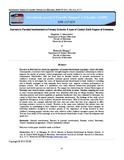Barries to parental involvement in primary schools: a case of Central North Region of Botswana

View/
Date
2013-03Author
Mannathoko, M.C.
Mangope, B.
Publisher
IJSRE, http://www.ijsre.comType
Published ArticleMetadata
Show full item recordAbstract
Research in Botswana has shown the importance of parental involvement in primary school education.
Consequently, researchers have argued for strengthening the school-community relationship in order to improve the quality of primary school programmes and enable children to succeed in the academic
environment. Nonetheless, little has been done to identify barriers to parental involvement in
children’s academic work and possible solutions geared towards quality education. This study therefore seeks to investigate the causes of limited parental involvement in their children’s schooling and to identify strategies to help minimise these barriers and improve academic performances in
primary schools. This study is a qualitative case study wherein twenty-four participants (twelve
teachers and twelve parents) are interviewed. The sample was drawn from the Central North region of
Botswana and covered remote, remotest, sub-urban, and urban locations. Random sampling was used
to select teacher-participants while parents were identified with help of village headmen. Botswana
education policies and school regulation or guideline handbooks were also examined to determine the
extent to which these documents promote community involvement. The findings of this study reveal
significant divergences in the responses of parents and teachers. Most of the parents, especially those
in remote areas, for example indicated that they were not aware that they were supposed to offer teaching assistance services in schools. Teachers in the same areas indicated that parents were not
cooperative in contributing to their children’s learning. Likewise, while teachers listed examples of
workshop initiatives designed to sensitise parents to the importance of being involved in their children’s learning, parents said they were only called to collect children’s progress reports, for Parent
Teacher Association (PTA) meetings, or to be threatened about failure to pay school development and
sports fees.
